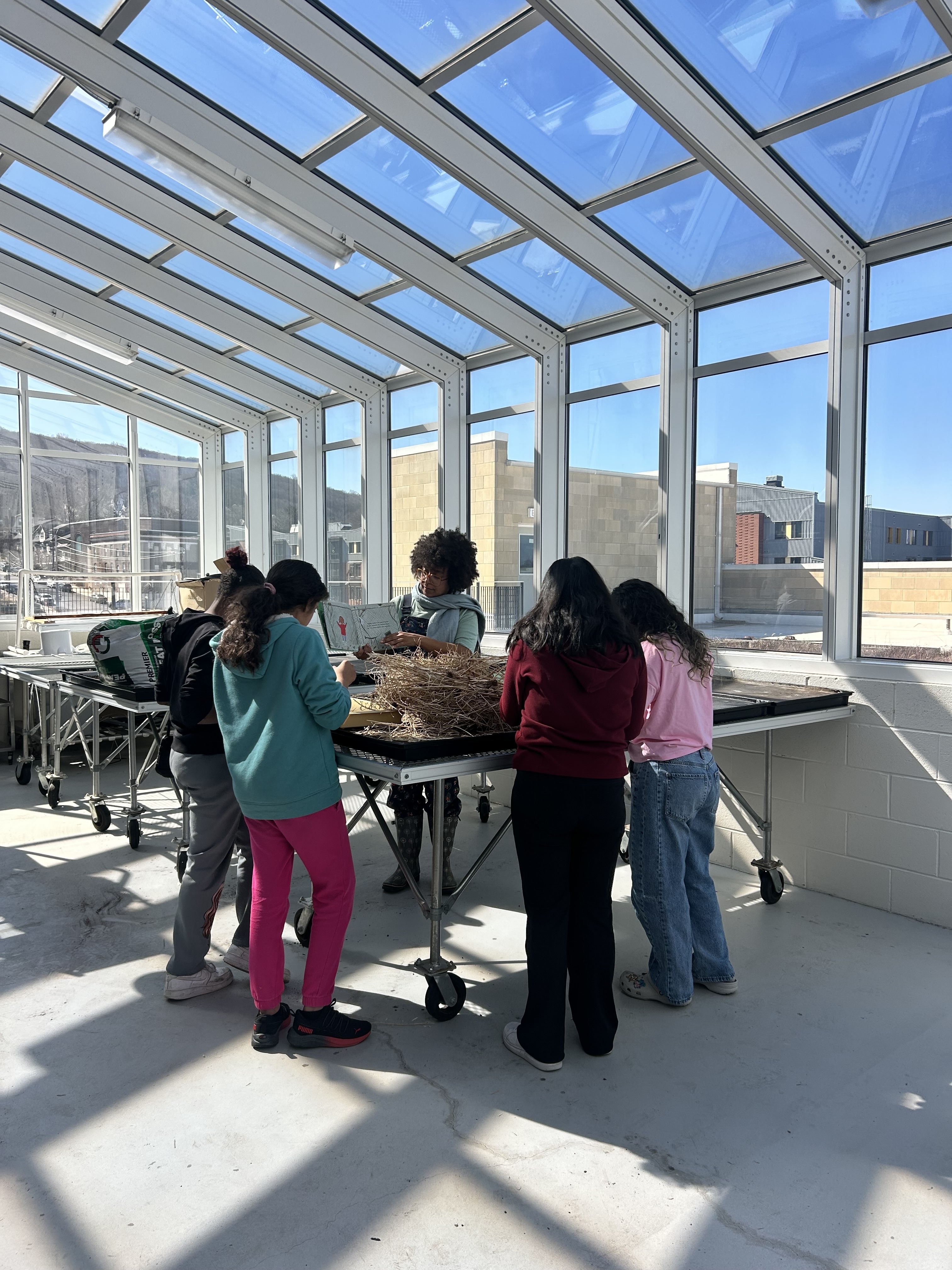
Kate Jackson has to be adaptable. As a scholar working at the intersection of environment, race, and health, she is passionate about improving community health. Importantly, her work is community-based: “I wait and see what issues are bubbling up and what people want to work on, and where I can help attach synergy and resources to,” she said. Working collaboratively with communities on their highest needs and priorities as full partners is a key priority for the College of Health (COH).
As an assistant professor, department of community and global health in the COH, Jackson researches how environmental factors impact human health in a positive or negative way. Recent projects have focused on community gardens, housing affordability, trash and air pollution.
One such program began when Jackson learned from COH colleagues that Broughal Middle School, located just down the block from Lehigh’s Health, Science, and Technology (HST) building, sought to reengage students in their rooftop greenhouse and were looking for support. She saw an opportunity to help.
Jackson is deeply connected to the local green space community. “Rather than try and build something that’s faculty or student run that might fluctuate with the academic calendar, I thought it might be really cool to highlight our neighbors who are doing the great work and see if they could benefit from using the space, which also benefits the students.”
Jackson worked alongside Nia Watson, coordinator for Community Action Development Bethlehem, to bring a garden program to life. Watson had been developing a curriculum for a plant therapy program, focusing on the connections between growing plants and personal growth, and giving students a safe place to rest and grow alongside the plants. Celebrating the students’ many cultural heritages, as well as their family’s plants and recipes, was also central to the program. The seeds came from Sistah Seeds, a local grower and distributor of seeds from the African diaspora.
Throughout the 2024-2025 school year, the students came to the greenhouse every Monday and Friday during an elective period. They grew all the plants from seed, and considered themes of growth and change in both the plants and themselves.
At the end of the program, the students presented the plants to community members who tend the MLK Community Garden and Esperanza Garden in the South Side of Bethlehem. “Both of those gardens are fully populated with these gorgeous plants that are going to feed this outside community from our students. That cycle was really important to us. Oftentimes, school gardens get interrupted by the end of the school year,” Jackson said.
“The residents were thrilled with the plants that were grown, the garden is thriving, and the kids learned a lot,” Jackson added. As this was a pilot program funded by a Lehigh University Faculty Innovation Grant, she plans to apply for larger funding streams to continue the program in the future.
In addition to the Broughal school garden, Jackson continues her work on a collaborative project between Lehigh students and the Bethlehem community to address persistent waste challenges. The city of Bethlehem currently has no trash services, so residents arrange for their own trash removal. As there are 26 different haulers that can come any day of the week, every day is trash day. Trash is a “very visible representation of environmental injustice,” she said.
Student teams have provided “incredible” support on this project, from the community-based participatory methods class where it started, to becoming a Mountaintop project, and now a Social Impact Fellowship. “We were tasked with hearing how it affects people’s mental health, physical health, emotional health, spiritual health, and then, what are some of the solutions that we can propose to create a better environment and increase health for folks? That’s a mixture of policy recommendations, ordinance changes, and community education,” she said.
Their work emphasizes caring for spaces and highlighting the pride that residents have in their communities. By organizing regular cleanups, they have helped bring neighbors together and build a deeper sense of community. The Mountaintop team, “Community Mapping for Environmental Justice,” collaboratively generated an online map highlighting areas of significant trash buildup, allowing for targeted strategies to clean and improve these hotspots. Under Jackson's mentorship, this student research team recently presented on the trash mapping project at the Engaged Scholars Consortium conference in Portland.
As another example of her advocacy efforts, Jackson was a featured panelist at an Earth Day event in April titled “Green Goals: Living Lighter on the Planet,” organized by the Women’s Business Council of the Greater Lehigh Valley Chamber of Commerce. During a conversation about sustainability with local business leaders, she shared practical insights for ways to reduce environmental impact, understand local climate issues, and get involved.
Jackson looks forward to teaching her community-based participatory methods again this fall, even though she does not have a project yet. And that’s intentional. She will be putting out a call to the community welcoming applications from community groups or leaders who may have a research project related to community and health, who could benefit from the support of a group of engaged students.
“We’re going to be on a little bit of an adventure. In that class, the problem is identified by the community, and then everything we do is meant to be shared together, cooperatively, in an equitable manner. We’re solving a local problem together, and improving something in the local environment,” she said.